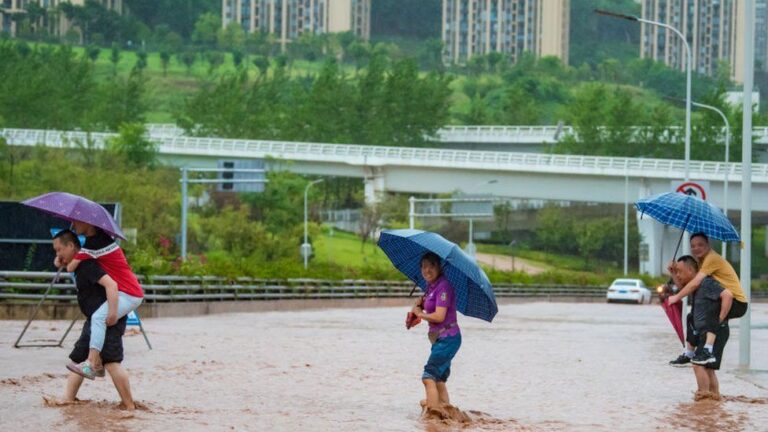A typhoon has lashed southern Japan, forcing evacuations and cutting off power to one-third of homes on the Okinawa islands.
Slow-moving Khanun – the third typhoon to hit East Asia in as many weeks – threatens to worsen the heaviest rains in Beijing in more than a century.
The deluge has killed at least 34 people in China so far.
Experts say that extreme weather events like this will become more frequent because of global warming.
Khanun follows two other typhoons, Talim and Doksuri, a super storm, which also drenched the Philippines and Taiwan, killing more than 30 people, in the last few weeks.
It was expected to make landfall on China’s north-east coast on Wednesday but forecasts now say it is more likely to turn towards the Japanese mainland without hitting China.
Japan’s tropical Okinawa islands are expected to face the brunt of Khanun’s 252km/h (156mph) gusts on Wednesday.
About 20,000 people have been advised to evacuate and nearly 900 flights have been cancelled at Okinawa’s Naha airport. This is peak tourist season for the island. Such strong storms are rare at this time of the year in Japan.
But climate scientists have long warned that global warming would increase the intensity and frequency of storms and heatwaves, both of which have hit parts of Asia in the past month.
Winston Chow, a professor in urban climate at Singapore Management University, likens the extreme weather to a game of roulette, where people place bets on red and black squares. He says the chances of an extreme weather event occurring – that is, a ball landing on a red square – have increased because of climate change.
“The more emissions we put out, the more black squares turn red, so the odds are we will land more frequently on the red every year,” he said.
The combined effect of three storms has drenched the Chinese capital Beijing and its neighbouring regions such as Tianjin and Hebei province since late last week. About 974,400 people have been evacuated in Beijing and Hebei, according to state media.
Beijing alone has experienced the “heaviest rainfall in 140 years” over the past few days, breaking the record set in 1891, according to officials,who have warned of more “significant rainfall”.
BBC



























